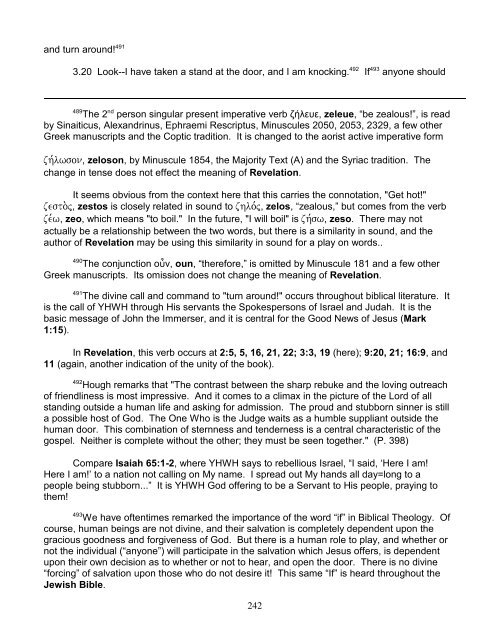Revelation 3:14-22 - Indepthbible.org
Revelation 3:14-22 - Indepthbible.org
Revelation 3:14-22 - Indepthbible.org
You also want an ePaper? Increase the reach of your titles
YUMPU automatically turns print PDFs into web optimized ePapers that Google loves.
and turn around! 491<br />
492 493<br />
3.20 Look--I have taken a stand at the door, and I am knocking. If anyone should<br />
489 nd<br />
The 2 person singular present imperative verb æÞëåõå, zeleue, “be zealous!”, is read<br />
by Sinaiticus, Alexandrinus, Ephraemi Rescriptus, Minuscules 2050, 2053, 2329, a few other<br />
Greek manuscripts and the Coptic tradition. It is changed to the aorist active imperative form<br />
zh,lwson, zeloson, by Minuscule 1854, the Majority Text (A) and the Syriac tradition. The<br />
change in tense does not effect the meaning of <strong>Revelation</strong>.<br />
It seems obvious from the context here that this carries the connotation, "Get hot!"<br />
zesto.j, zestos is closely related in sound to zhlo,j, zelos, “zealous,” but comes from the verb<br />
ze,w, zeo, which means "to boil." In the future, "I will boil" is zh,sw, zeso. There may not<br />
actually be a relationship between the two words, but there is a similarity in sound, and the<br />
author of <strong>Revelation</strong> may be using this similarity in sound for a play on words..<br />
490<br />
The conjunction ïí, oun, “therefore,” is omitted by Minuscule 181 and a few other<br />
Greek manuscripts. Its omission does not change the meaning of <strong>Revelation</strong>.<br />
491<br />
The divine call and command to "turn around!" occurs throughout biblical literature. It<br />
is the call of YHWH through His servants the Spokespersons of Israel and Judah. It is the<br />
basic message of John the Immerser, and it is central for the Good News of Jesus (Mark<br />
1:15).<br />
In <strong>Revelation</strong>, this verb occurs at 2:5, 5, 16, 21, <strong>22</strong>; 3:3, 19 (here); 9:20, 21; 16:9, and<br />
11 (again, another indication of the unity of the book).<br />
492<br />
Hough remarks that "The contrast between the sharp rebuke and the loving outreach<br />
of friendliness is most impressive. And it comes to a climax in the picture of the Lord of all<br />
standing outside a human life and asking for admission. The proud and stubborn sinner is still<br />
a possible host of God. The One Who is the Judge waits as a humble suppliant outside the<br />
human door. This combination of sternness and tenderness is a central characteristic of the<br />
gospel. Neither is complete without the other; they must be seen together." (P. 398)<br />
Compare Isaiah 65:1-2, where YHWH says to rebellious Israel, “I said, ‘Here I am!<br />
Here I am!’ to a nation not calling on My name. I spread out My hands all day=long to a<br />
people being stubborn...” It is YHWH God offering to be a Servant to His people, praying to<br />
them!<br />
493<br />
We have oftentimes remarked the importance of the word “if” in Biblical Theology. Of<br />
course, human beings are not divine, and their salvation is completely dependent upon the<br />
gracious goodness and f<strong>org</strong>iveness of God. But there is a human role to play, and whether or<br />
not the individual (“anyone”) will participate in the salvation which Jesus offers, is dependent<br />
upon their own decision as to whether or not to hear, and open the door. There is no divine<br />
“forcing” of salvation upon those who do not desire it! This same “If” is heard throughout the<br />
Jewish Bible.<br />
242

















